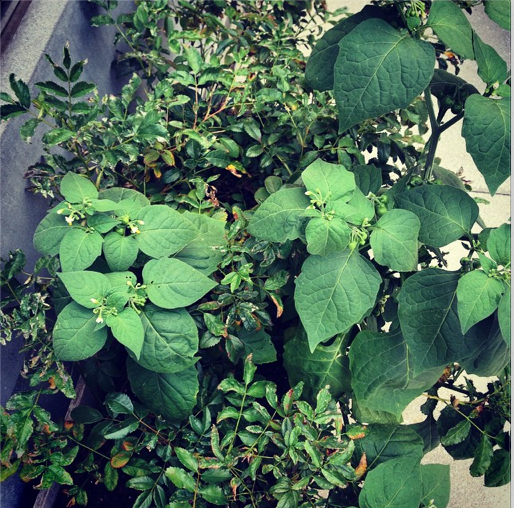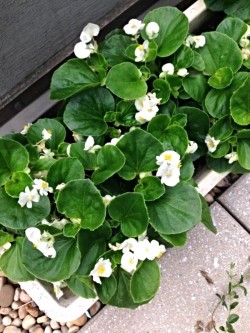Last month I inherited a garden’s worth plants via freecycle from Jan, a visiting Californian who was cleaning out her mother-in-law Stella’s NYC apartment after Stella passed away at 88.
Stella’s plants were her great passion and since transporting them from NYC didn’t make sense, Jan and her husband Martin were thrilled to give them to me.
This is the first year I’ve had a terrace with an urban garden and I’ve learned so much about gardening that’s spilled over into my spiritual awareness.
1. Don’t be afraid to cut things back: everything grows back stronger.
The impatiens were, frankly, a mess—sad and neglected since Stella’s death a few weeks before.
In theory, I knew they would grow back, but for a few days I resisted cutting everything down to the healthy portions of the plant. I think I somehow secretly hoped the plants would “grow around” the brown, mottled leaves without being pruned. Mostly, cutting them back seemed, however illogical this is, too brutal since I’d be reducing them to small, stumpy plants.
Once I took out my scissors, though, and removed everything that wasn’t healthy, within a week the impatiens were thriving again. Within two weeks they were overflowing.
The same thing happened with the begonias and especially the schefflera.
The schefflera had a lot of leaves that were just kind of hanging in there, not quite thriving yet still mostly alive, and definitely taking up a lot of energy. Once I removed the unhappy leaves, major new growth started happening.
Looking at the garden now is a helpful reminder to remember to remove what’s just not working in my life so that the healthy parts can truly thrive.
2. We have to check in frequently, if not daily.
Although the plants won’t cry out with sound, they need your attention. If you miss a few days, especially in the summer heat, the next time you gaze at your garden, you might find your formerly healthy plants looking sad and neglected.
It’s the same with all my spiritual and well-being practices (yoga, exercise and meditation). Although I might be able to “get away with” missing a day or two, I really can’t check out for long periods without suffering the effects of inner draught. And like with my plants, I might only notice this after some inner or outer shriveling.
3. Nature will do most of the work.
Yes, I have to make sure the soil is adequately moist and that they are receiving the proper amount of light, but other than that nature will take care of 98 percent of the work.
As Rumi said, “Your task is not to seek for love, but merely to seek and find all the barriers within yourself that you have built against it.” The same is true for well-being. We don’t have to manufacture well-being, we just have to remove any obstacles toward allowing it.
In other words, just like my plants, we’re meant to thrive.
4. No cookie cutter solutions.
Each plant is different. Sometimes the soil in one will be parched and its next door neighbor will still be moist for days. What works for one person, one plant, one situation, isn’t necessarily a universal. You can’t force a shade loving plant to thrive in the sunlight any more than you can transform an introvert into a party animal.
I’m reminded of this every time I’m teaching yoga, recognizing that not only are all bodies different, so is what each individual body needs from the practice on any given day.
5. It’s all about the roots.
I stopped by the garden shop this morning to ask about adding some ivy in the base of my maple tree’s pot, inquiring whether the ivy would survive the winter outside as well as the maple would.
The gardener answered, “It’s all about the roots. They have to be established enough before the frost hits.”
In other words, if our spiritual and wellness practices are firmly grounded, they’ll get us through even the most challenging times.
6. A weed by any other name…
Emerson mused “What is a weed? A plant whose virtues have not yet been discovered” and A.A. Milne shared that “Weeds are flowers too, once you get to know them.”
I feel the same way. In fact, before Stella’s plants arrived, I had one window box that simply “happened.” It may contain some perennials from the previous tenant years ago (although I doubt it) but it definitely fosters a bunch of overflowing weeds that simply appeared of their own free will.
I openly admit to admiring the outlaw nature of weeds, along with their tenacity. Realizing that it’s only because they are labeled “weeds” that I would remove them, instead I celebrate their beauty and their feistiness.
7. Gardens give us hope.
Audrey Hepburn said, “To plant a garden is to believe in tomorrow.” So many aspects of gardening—nurturing other life forms, witnessing expansion and growth, admiring beauty—give us faith in ourselves and the future.
There’s a proverb says that “The best time to plant a tree is twenty years ago. The second best time is now.”
I’d second that, knowing that I’m continuing Stella’s legacy with trees and greenery she nurtured from seedlings, plants that will bring me and others much joy for years to come.
Love elephant and want to go steady?
Sign up for our (curated) daily and weekly newsletters!
Editor: Catherine Monkman
Photo: Author’s Own














Read 2 comments and reply